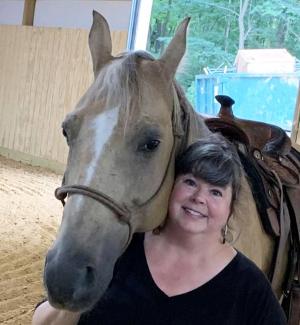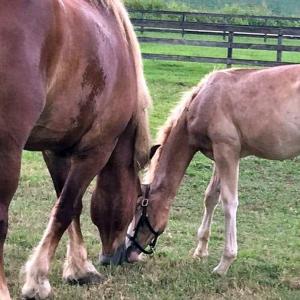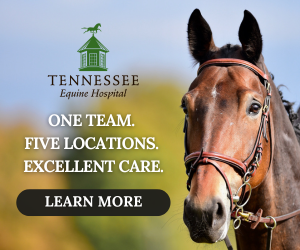By Jennifer Dunlap, DVM
It’s hard to believe that the rescue organization I work with, Animal Response Foundation (ARF), is already celebrating its fifth year in operation. ARF has worked on dozens of cases and saved hundreds of animals’ lives and, I am proud to say, has worked hard to make a difference in its corner of the world, here in west Tennessee.
A rescue horse is simply a horse who through no fault of his own has ended up in a bad situation. Horses end up with ARF, or in similar rescues, for a variety of reasons, none of which are their fault. The majority of the horses who come to ARF are from animal cruelty cases, and ARF is known for taking some of the worst of the worst, horses too weak to stand without our Anderson Sling or too anemic to survive without a blood transfusion. Some are abandoned with no known owners and some are owner surrenders due to an owner’s difficult change in circumstances. I’ve seen rescue horses come through with papers/sales receipts recorded of upwards of $50,000 and others who were once valued, but now are no more due to age, injury or behavioral issues.
Each horse is special and has its own unique story to tell. It is critical to give these horses the time and effort they deserve to help them decompress, get healthy, form new bonds with people and other horses, and then get trained and ready to be adopted. From the time a severely neglected horse comes in until the time it is adopted, it generally takes about 4-6 months. A lot of blood, sweat, and tears go into pulling these horses through.
When doing rescue with horses, it is important to make sure you have appropriate equipment to keep the horses, your team, and yourself safe. This includes adequate staffing, trailers, feed, hay, enclosures, and veterinarians and farriers. Many of the horses we see in rescue situations are not halter broken and may be very nervous around people, so we move slowly and ease them onto a trailer using round pen panels. Once we get them where they need to go, we gently unload them into a secure area where they can decompress and we can safely water, feed, and access them for care.
The harsh reality is that the most important pieces of equipment you need to do this kind of work are funds and resources. Rescue is expensive. This is why unpaid volunteers are worth their weight in gold, and why donations and fundraisers are so very important, since a sound business and financial plan must be in place for a rescue to be sustainable. I have many colleagues and friends in the rescue community and one of the hard truths that all rescues face is that they do not have the funds to save them all. I’ve been doing this a long time and it is the hardest thing in the world for a rescue to turn someone down. None of the rescues have the funds to save them all, but 100% of the rescues wish they did. It is heartbreaking to have to turn down a case or an animal because a rescue cannot afford to take on “just one more;” but it is the only way a rescue can afford to care for the ones they have. Some of the hoarding cases I have handled were once good legitimate rescues. But their “switch was flipped” and they began taking in more animals than they could adequately care for, in part, due to the pressure they put on themselves and the pressure others put on them to “save them all.” Of course, in hoarding situations, there are also significant mental health issues, which more courts are addressing in sentencing during a court case.
So, what can you do to help a rescue and the horses in your community? I like to shop local and I am writing this as I gaze out at the 15 pumpkins on my porch that I bought at a local farmers market. However, I must own up to the fact that about ten are for one of my dogs who considers pumpkins his favorite treat. You can not only shop local, but also support local. You can get to know the organization you want to support that way.
Train your horse to be a solid citizen. There is an old saying that a well trained horse will never want for a home. God forbid something happen to anyone, but if the day should come that your horse needs a new home, give him or her his best shot at getting a great one by teaching them to halter, load on a trailer, quietly stand for grooming, get adequate veterinary care and farrier care and, if possible, to be ridden. Most horse rescues primarily focus on animal cruelty cases, but most of the ones I know also take a few owner surrenders once in a while. Which one do you think they are more likely to take: the 15-year-old friendly riding horse or the 10-year-old who has never been handled and is not halter broken?
Finally, I want to give a plug for gelding your colt/stallion. I think there is a place for rescue and for well bred horses. A good breeder will either take back a horse they have bred or will assist in finding a new home for that horse, if needed. But for the most part, in the world of animal cruelty, when we see 20-30 horses on a farm, at least 10-15 of those are stallions. This makes it more difficult to find placement for those horses and, many times, those horses have roughed up one another quite a bit with that many stallions in close quarters. It is cheaper and easier on the horse if castrations are done when they are young. Due to COVID-19 we were not able to hold my TN/MS Geldathon this year, but we will be holding it next summer with availability to do ten colts/stallions. This program pairs a colt with my fourth year vet student externs, who assist in the castration. Each colt/stallion gets castrated and vaccinated for $120. This is a great program for my externs and for the horse population in our area. You can reach out to me for the details if this is something you are interested in.
Rescue is a labor of love and community support is what enables the great saves and the happy endings, so please consider supporting a horse rescue in your area today either as a volunteer, a foster home, an adopter, and/or financial supporter.
If you wish to donate to ARF, please visit www.animalresponse.org. See more on facebook at: Animal Response Foundation. I also work with Redemption Road Rescue in Jackson, Tennessee. Visit them at: https://redemptionroadrescue.com/
Editor’s note: There’s also Mississippi Horse Rescue. Find information at: www.mississippihorses.org.
It’s hard to believe that the rescue organization I work with, Animal Response Foundation (ARF), is already celebrating its fifth year in operation. ARF has worked on dozens of cases and saved hundreds of animals’ lives and, I am proud to say, has worked hard to make a difference in its corner of the world, here in west Tennessee.
A rescue horse is simply a horse who through no fault of his own has ended up in a bad situation. Horses end up with ARF, or in similar rescues, for a variety of reasons, none of which are their fault. The majority of the horses who come to ARF are from animal cruelty cases, and ARF is known for taking some of the worst of the worst, horses too weak to stand without our Anderson Sling or too anemic to survive without a blood transfusion. Some are abandoned with no known owners and some are owner surrenders due to an owner’s difficult change in circumstances. I’ve seen rescue horses come through with papers/sales receipts recorded of upwards of $50,000 and others who were once valued, but now are no more due to age, injury or behavioral issues.
Each horse is special and has its own unique story to tell. It is critical to give these horses the time and effort they deserve to help them decompress, get healthy, form new bonds with people and other horses, and then get trained and ready to be adopted. From the time a severely neglected horse comes in until the time it is adopted, it generally takes about 4-6 months. A lot of blood, sweat, and tears go into pulling these horses through.
When doing rescue with horses, it is important to make sure you have appropriate equipment to keep the horses, your team, and yourself safe. This includes adequate staffing, trailers, feed, hay, enclosures, and veterinarians and farriers. Many of the horses we see in rescue situations are not halter broken and may be very nervous around people, so we move slowly and ease them onto a trailer using round pen panels. Once we get them where they need to go, we gently unload them into a secure area where they can decompress and we can safely water, feed, and access them for care.
The harsh reality is that the most important pieces of equipment you need to do this kind of work are funds and resources. Rescue is expensive. This is why unpaid volunteers are worth their weight in gold, and why donations and fundraisers are so very important, since a sound business and financial plan must be in place for a rescue to be sustainable. I have many colleagues and friends in the rescue community and one of the hard truths that all rescues face is that they do not have the funds to save them all. I’ve been doing this a long time and it is the hardest thing in the world for a rescue to turn someone down. None of the rescues have the funds to save them all, but 100% of the rescues wish they did. It is heartbreaking to have to turn down a case or an animal because a rescue cannot afford to take on “just one more;” but it is the only way a rescue can afford to care for the ones they have. Some of the hoarding cases I have handled were once good legitimate rescues. But their “switch was flipped” and they began taking in more animals than they could adequately care for, in part, due to the pressure they put on themselves and the pressure others put on them to “save them all.” Of course, in hoarding situations, there are also significant mental health issues, which more courts are addressing in sentencing during a court case.
So, what can you do to help a rescue and the horses in your community? I like to shop local and I am writing this as I gaze out at the 15 pumpkins on my porch that I bought at a local farmers market. However, I must own up to the fact that about ten are for one of my dogs who considers pumpkins his favorite treat. You can not only shop local, but also support local. You can get to know the organization you want to support that way.
Train your horse to be a solid citizen. There is an old saying that a well trained horse will never want for a home. God forbid something happen to anyone, but if the day should come that your horse needs a new home, give him or her his best shot at getting a great one by teaching them to halter, load on a trailer, quietly stand for grooming, get adequate veterinary care and farrier care and, if possible, to be ridden. Most horse rescues primarily focus on animal cruelty cases, but most of the ones I know also take a few owner surrenders once in a while. Which one do you think they are more likely to take: the 15-year-old friendly riding horse or the 10-year-old who has never been handled and is not halter broken?
Finally, I want to give a plug for gelding your colt/stallion. I think there is a place for rescue and for well bred horses. A good breeder will either take back a horse they have bred or will assist in finding a new home for that horse, if needed. But for the most part, in the world of animal cruelty, when we see 20-30 horses on a farm, at least 10-15 of those are stallions. This makes it more difficult to find placement for those horses and, many times, those horses have roughed up one another quite a bit with that many stallions in close quarters. It is cheaper and easier on the horse if castrations are done when they are young. Due to COVID-19 we were not able to hold my TN/MS Geldathon this year, but we will be holding it next summer with availability to do ten colts/stallions. This program pairs a colt with my fourth year vet student externs, who assist in the castration. Each colt/stallion gets castrated and vaccinated for $120. This is a great program for my externs and for the horse population in our area. You can reach out to me for the details if this is something you are interested in.
Rescue is a labor of love and community support is what enables the great saves and the happy endings, so please consider supporting a horse rescue in your area today either as a volunteer, a foster home, an adopter, and/or financial supporter.
If you wish to donate to ARF, please visit www.animalresponse.org. See more on facebook at: Animal Response Foundation. I also work with Redemption Road Rescue in Jackson, Tennessee. Visit them at: https://redemptionroadrescue.com/
Editor’s note: There’s also Mississippi Horse Rescue. Find information at: www.mississippihorses.org.










